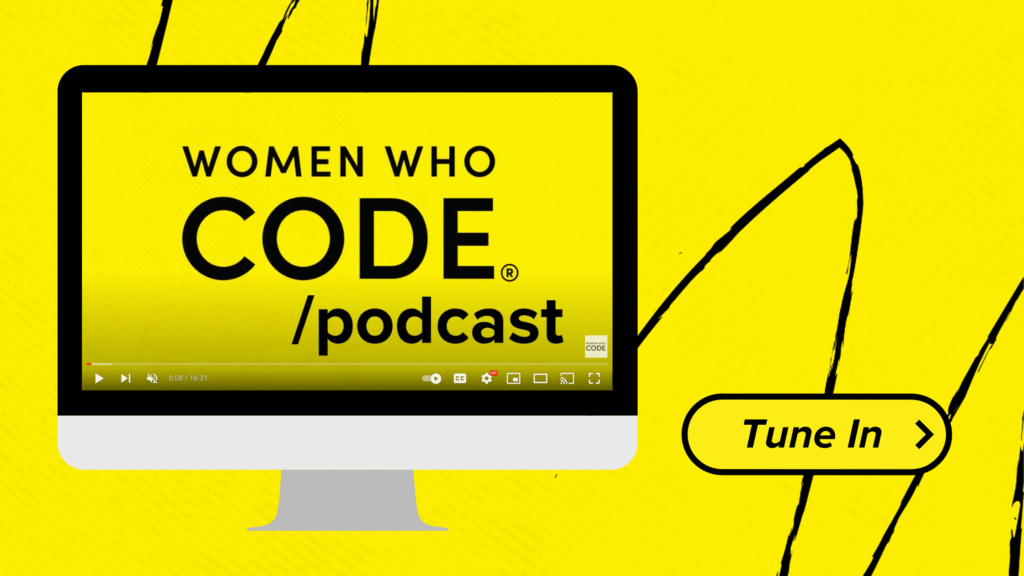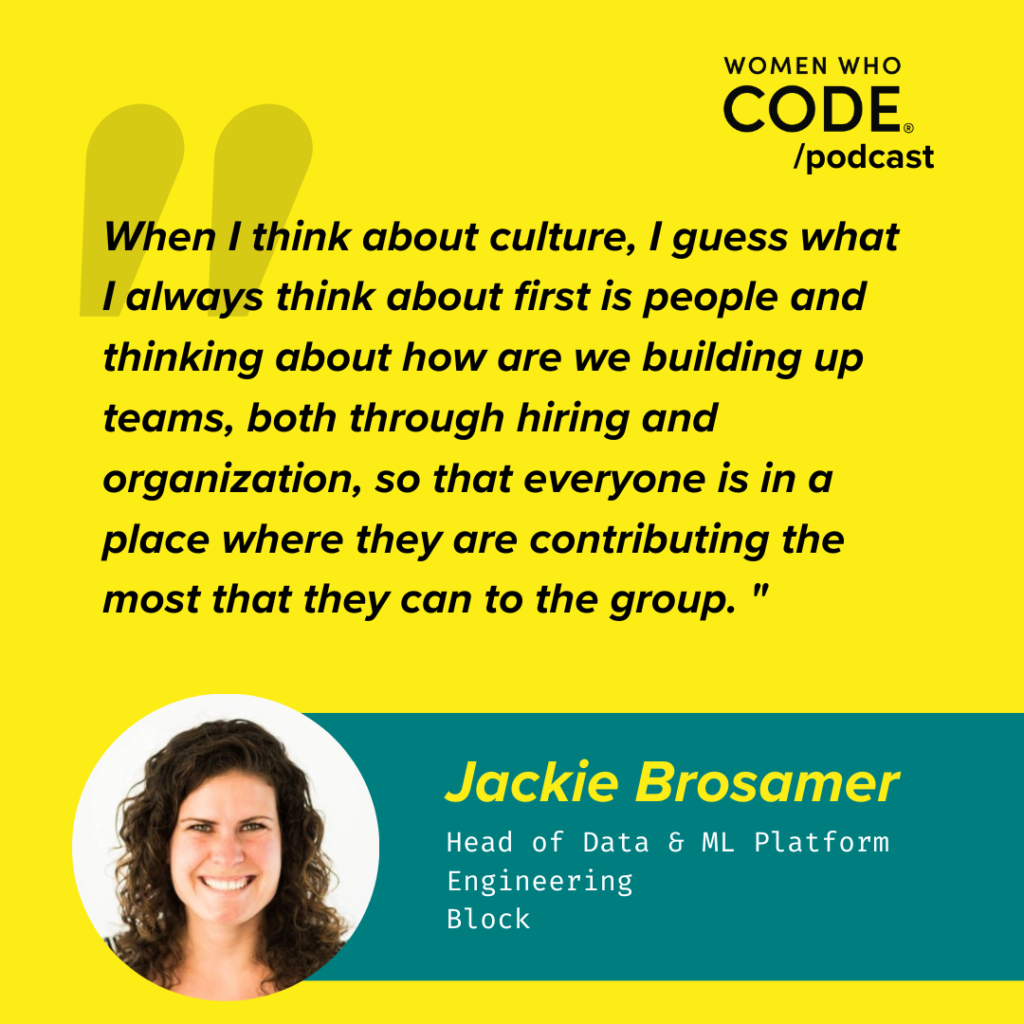Conversations #102: Jackie Brosamer, Head of Data and Machine Learning Platform Engineering at Block
Written by Women Who Code
This article has been adapted from the recording of WWCode Conversations #102.

Lianna Novitz, a Director for Women Who Code East Bay, interviews Jackie Brosamer, Head of Data and Machine Learning Platform Engineering at Block. They discuss Jackie’s start in physics, her path to her current position, and how owning a small horse farm brings her balance.
Can you tell us more about your career journey and what led you to Block, especially your transition from physics to data infrastructure?
My resume may look like I’ve had a random collection of jobs, but there’s a consistent theme around understanding and finding patterns and new use cases in big data sets. I started in high energy physics research, where I was doing a lot of analysis of data sets where we were trying to find new particles. There are a lot of really interesting computational techniques there, like Monte Carlo and machine learning. After undergrad, I ended up working in finance for a few years. That was a great experience to learn more about the working world, but it wasn’t quite the right cultural fit. It set me up for success when I returned to grad school for my physics Ph.D. at UC Berkeley. I spent some time working on the Large Hadron Collider, an experiment in Switzerland where they try to smash particles together quickly and see what happens.
What happens is lots and lots of data that you need to use sophisticated techniques like machine learning. I got a lot of practice working with really high-scale datasets. While I was in grad school, I discovered that there was this new cool thing called data science and machine learning. I started exploring what that might look like for a career. During grad school, I started a workshop with some other grad students, where Ph.D. students work on taking all these scientific computational skills they already had and figuring out how to apply them to more traditional tech projects. As part of that, I connected with some industry folks already working in data science and machine learning to partner with some of these grad students. That’s how I learned about Block through one of those mentors who worked there. After grad school, I interviewed at various tech companies and found that Block was the best fit for me. I loved the people and was passionate about this mission of financial empowerment driven by the company. I’ve been here ever since.
How many years has it been at Block?
Eight years.
Tell us more about your current role at Block, even though it’s changed a lot over the past eight years, particularly around the responsibilities of the data and machine learning platform team.
When I started at Block, I was one of the first machine learning engineers on our small business lending product. I started managing people on that lending team. Then, we did a bunch of different things related to financing, underwriting and risk. During the pandemic, there were a bunch of shifts in our business, and my role changed a little bit. I realized that I was passionate about pursuing something that was more technical. I ended up taking this platform role.
During my current role, I spend a lot of time with my team, ensuring we’re working on the right things. I spend a lot of time with the team, understanding their work and how the work between different teams fits together. I also spend a lot of time with stakeholders that are outside of my immediate team. They are spread across the company through all these different business units: Square, Cash App, TIDAL, and TBD. I need to understand what all those stakeholders are thinking about the product and the business and make sure that our infrastructure strategy is going to support that.
If somebody only gives you a month lead time for a new product launch, how does that impact your day-to-day?
Our team’s work falls into two buckets. One is long-term investments that are a little less directly driven by a product team coming and saying, “Hey, I need this thing right now.” The other bucket is investments. We’re always thinking about where we want to be in two, three, and five years.
A lot of my team’s offsite and in-person time is spent whiteboarding. We draw out our architectural vision in five years to ensure we always drive towards that. If we’re doing a good job and envisioning how that long-term technical architecture needs to evolve, then we’ve generalized our platform enough to support any new use cases that might come in. Then, hopefully, when someone says, “Hey, I need to launch this new product next month,” we can pull into that remaining bucket. The short-term ends up being more reactive than proactive work. It’s really about making sure that you have that right balance between proactive and reactive work so that you’re able to respond to needs that you might not have anticipated and needs that you did anticipate.
What tools do you use to ensure your team can remain flexible with new use cases?
One of the interesting pivots I’ve experienced at this company has been the shift from server-based technologies, where everything’s in the data center, to the modern data stack, where everything’s cloud-based and serverless. Part of that is we’ve transitioned to buying versus building in many places. We’ve looked at our business more holistically, and many of these data infrastructure components are not really needs that are unique to our company. We can use something that’s off the shelf. Whereas something that’s going to be really close to payments, lending, or AI, something that’s really at the heart of our business, we’re always going to build those ourselves.

As engineering teams imagine possibilities for their culture, how can they ensure that the shared vision is inclusive, inventive, and future-proof?
When I think about culture, first is people and building up teams through hiring and organization so that everyone is in a place where they contribute the most they can to the group. A big piece of that is diversity. Diversity has a lot more dimensions than we often talk about. We always focus on all the protected classes when we’re reporting on diversity. When I’m hiring, I think more holistically than that and think about not just someone’s demographics but what is their background. Also, make sure that we have a balance of expertise. All of these things are really important balances. I also spend a lot of time coaching. Especially now that we’ve moved into a remote environment, ensuring everyone’s aligned on the big-picture vision and the architecture is very important. Everyone needs to understand where we’re going.
Do you find that there’s a good ratio of individual contributors to tech leads?
Yeah, everyone’s going to have a different opinion on this. Every company defines tech lead and manager differently. What works really well is to have relatively small squads, not even quite a team, around five engineers partnering closely with a senior tech lead who can help those more junior engineers on a day-to-day basis.
Where do you see the FinTech industry going as it evolves and becomes more innovative and inclusive?
Many really exciting things have changed over the last five years, and I’m sure even more will change over the next five. A big trend that everybody’s talking about right now and is very relevant to my background is everything that’s happened with Generative AI. It’ll be really interesting from a platform perspective. It’s interesting to think about how AI can help to smooth out some of these scenes in our user experience and make automation easy. Another thing that will start happening is changes in regulations that will impact FinTech. It’ll be really interesting to see how that evolves.
Are you responsible for keeping up to date with all these regulations, or do you have somebody on your team who is supposed to keep track?
One of the things I love most about my job is I get to partner with almost every function in the company. We partner closely with compliance and legal teams that are on the front lines of understanding these regulations and what they mean. We have to work closely with them to understand the technical systems and help figure out how some of these new regulations might end up being implemented on the ground.
What are you passionate about outside of work?
I have a lot of hobbies that are not uncommon to people in my role, like reading and that stuff. One of my more unusual hobbies is that I moved from the Bay Area to just outside Seattle a few years ago, where I now own a small horse farm. It’s basically like a small business in my backyard where people can pay to keep their horses. It’s been really great to have, especially in remote work. It’s a balance between something where I get to work outside and something that’s very concrete. It’s different from my day-to-day work at Block to kind of balance out those energy levels.
Can you share any pro tips for women in tech looking to become a leader in their field?
I’ve always tried to make sure that I am optimizing for impact. That’s always served me really well and is one reason I’ve stayed at Block so long. I’ve always felt rewarded for having that impact. Early in your career, knowing what to aim for can be hard. A big transition point for a lot of people is going from an individual contributor to a manager. You will have a lot of chances to do that. I always advise people early on in their careers to optimize for figuring out how to make an impact and learn rather than a particular line on their resume.
For people still determining whether they want to be managers, is there a sign that you think is an indicator that people should become managers?
If you want to be a manager, you have to understand the pros and cons. At Block, we have two different career ladders that are seen as equal. You can get promoted all the way to the top of it by just being an IC. I encourage people that you want to avoid becoming a manager because it feels like a promotion. I’m a manager because I love helping people, especially those who work for me.